
Finding Military Discounts with Septic Pumping Companies Near Me in Acton
Septic System Examination: Protect Your Safety
Have you ever considered the value of your septic system and the risks of its failure? In modern times, where effective sewage management is vital, septic system inspections are crucial. They spot issues in advance, preventing public-health threats and costly repairs. Especially in rural areas, homeowners should make these assessments a chief concern for property safety and environmental cleanliness.
Primary Conclusions
- Scheduled septic system inspections are crucial for preventing costly repairs.
- Septic tank assessment can pinpoint problems promptly, protecting health and ecosystem.
- A professional septic inspection entails thorough examinations by certified inspectors.
- Understanding your septic system can enhance its longevity and efficiency.
- Neglecting to inspect can lead to major health risks and property damage.
Understanding the Importance of Septic Systems
Septic systems are essential for managing household wastewater, particularly where there’s no municipal sewage link. They process on-site wastewater treatment, maintaining harmful pollutants at bay. This operation is key for environmental safety.
Steady maintenance and checks are essential for septic systems to safeguard community health effectively. A system in good condition avoids wastewater leaks. These leaks can contaminate water sources, putting drinking water and community health at risk.
There’s a direct link between a well-managed septic system and environmental protection. Effective operation of these systems is key to reducing pollution and fostering sustainable lifestyles with septic cleaning services.
What Happens During a Septic System Inspection
The septic system inspection comprises crucial steps to check its functionality and safety. Experts from All in Sanitation perform a comprehensive review, focusing on multiple components of the system. They aim to ensure everything is in excellent order.
During the inspection, technicians check the septic tank, looking for any leaks or pipe issues. They measure the septic tank’s liquid levels to guarantee optimal performance. This comprehensive check prevents problems from worsening, sidestepping contamination and failure.
Grasping these essential steps enables homeowners to care for their septic systems effectively. By identifying issues early through a proper inspection, the system’s life can be significantly extended. This protects against potential risks.
Critical Elements Checked in a Septic System Inspection
A comprehensive septic system inspection covers vital components to ensure its efficient functioning. The initial focus is on the septic tank, a key element of the system. Inspectors evaluate the tank’s condition, searching for wear or damage signs. They look over the tank walls, inlet and outlet pipes, and look for any blockages.
Inspectors also assess the drain field, crucial for filtering effluent back into the groundwater. They look for standing water or abnormal vegetation signaling issues. The distribution box’s flow and distribution are inspected to confirm consistency across drain lines.
The septic baffle’s health is another significant check. Technicians ensure that the baffles are intact and function properly, preventing sludge from reaching the drain field. They also measure sludge and scum levels to ensure they are within safe limits.
The inspection’s final step is assessing the system’s watertight integrity. Inspectors confirm that the tank’s liquid level is normal, preventing any potential leaks or overflows. This detailed verification helps identify minor problems before they become large-scale repairs, thus safeguarding the septic system’s health.
| Component | Focus of Inspection | Importance |
|---|---|---|
| Septic Tank | Condition of walls, pipes, and obstructions | Critical for waste collection |
| Drain Field | Standing water, vegetation anomalies | Guarantees proper effluent filtration |
| Distribution Box | Flow and distribution checks | Keeps balanced drainage |
| Baffles | State and function | Prevents sludge migration |
| Liquid Level | Assessment of normal range | Prevents leaks and contamination |
Common Issues Detected in a Septic System Inspection
In septic system inspections, experts often spot various problems that hurt system efficiency. Foremost are excessively full tanks, usually because of too much water use or unnoticed leaks. This condition prevents the system from processing wastewater correctly, leading to backups and further issues.
Damage or malfunction in pipes is another typical issue found. Such faults block wastewater flow and can lead to costly fixes if ignored. Clogged filters also pose significant problems, lowering system performance and creating environmental risks.
Lack of upkeep aggravates these septic problems. Through regular checks, such issues can be recognized and resolved early. This proactive approach saves homeowners from steep repair costs and protects community health.
How Long Does a Septic System Inspection
A standard septic inspection lasts from 2 to four hours. Factors like property size and septic complexity affect this duration. Should surprise problems arise or bad weather hinder access, inspection times may stretch. Planning ahead with these timeframes in mind enables homeowners to plan efficiently for a detailed check.
It’s recommended for homeowners to be present at the inspection. It gives them to ask questions and understand the inspector’s observations firsthand. Scheduling the visit for a time when full attention can be given improves the experience and final result.
| Factor Affecting Time | Estimated Time (Hours) |
|---|---|
| Basic inspection | 2 – 3 |
| Complex system | 3 – 4 |
| Unforeseen issues | 4+ |
Inspection Interval of Septic System Inspections
Routine septic inspections are key to maintain your system’s service life and performance. It’s widely recommended for homeowners to have their septic system inspected every 3 years. This frequency may be adjusted depending on factors like the size of your household, the volume of daily water use, and the system’s age.
Bigger households or homes equipped with garbage disposals might need inspections sooner. Following the right maintenance schedule is important. It allows detect potential problems early and ensures your system operates efficiently.
Here’s a helpful table outlining factors that might affect your inspection frequency:
| Factor | Suggested Interval |
|---|---|
| Standard Household (2-3 people) | Every 3 years |
| Larger Household (4+ people) | Every 1-2 years |
| Home with Garbage Disposal | Every 1-2 years |
| Older Septic System | Annually |
Sticking with a regular septic maintenance plan offers peace of mind. It avoids expensive repairs and keeps your home safe and sanitary.
Consequences of Neglecting Regular Septic System Inspections
Not scheduling routine septic inspections increases the risk of system failures. Early-stage issues can grow into larger ones, requiring costly repairs. Wastewater backups from these failures endanger homes and the environment, risking groundwater contamination.
Unaddressed septic issues expose people and pets to harmful bacteria and diseases. Homeowners could prevent big bills with timely inspections. Ignoring routine maintenance can amplify a small problem into a larger crisis, disturbing your daily life and causing stress.
The financial burden of replacing an entire septic system can be overwhelming. Homeowners carry the full cost. However, ongoing inspections facilitate early problem detection, preventing issues from worsening. Regular maintenance not only lengthens the system’s life but also spares homeowners from potential financial and environmental disasters.
Homeowner Tips: Maintaining Your Septic System
For homeowners, septic system care is critical for its longevity and function. Applying proper maintenance tips ensures smooth operation and reduces repair costs. Small actions can greatly enhance septic tank performance.
Water conservation in the home is key. Minor tweaks like fixing drips and choosing efficient fixtures lower strain on the system. Households should be conscious of their water consumption.
Appropriate trash disposal is critical. Do not flush items such as wipes, period products, and grease – they harm the system’s balance. Dispose of such materials properly, using refuse receptacles or compost.
Limiting strong chemicals is also important. Household cleaners can damage the beneficial bacteria in your septic tank. Select eco-friendly cleaning products to safeguard this crucial ecosystem.
Ongoing monitoring on the drain field area are essential for efficiency. Look for saturated soil or standing water, signs of possible problems. These issues need quick action.
| Action | Rationale |
|---|---|
| Conserve water | Prevents system overload |
| Properly dispose of waste | Maintains balance of the tank |
| Limit harsh chemicals | Protects beneficial bacteria |
| Inspect drain field | Identifies potential problems early |
Implementing these septic system maintenance strategies will maintain your septic care on point. This secures a functional, enduring system for the future.
Professional Septic Inspection Services
Choosing professional septic inspection services is crucial for homeowners. Companies like All in Sanitation provide detailed septic system evaluations. Their experienced experts ensure no major issue goes unnoticed.
These professional septic inspectors employ state-of-the-art methods to discover problems. This capability is key for ensuring your septic system’s longevity and your property’s health. They offer guidance on how to keep your system functioning well.
Gains of Working with a Certified Septic Inspector
Working with a certified septic inspector delivers major benefits for homeowners. These inspectors have deep knowledge of local regulations and industry norms. Their expertise ensures comprehensive, accurate inspections, reducing the risk of missing key issues.
These experts have the skills to identify a wider spectrum of potential issues. Because of their advanced training, certified inspectors can notice subtle signs of deterioration or failure. This ability guarantees problems are tackled early, cutting homeowners significant costs and averting severe problems later.
Another noteworthy benefit is the peace of mind they provide to homeowners. Knowing a qualified professional is evaluating their system creates confidence. This confidence about the inspection’s quality offers added reassurance, strengthening the system’s reliability.
In summary, the positives of enlisting a certified expert for septic inspection obviously surpass any cost involved. These benefits include pinpoint accuracy, early detection of potential problems, and a strong sense of security among homeowners about their septic systems.
Bringing It All Together
Consistent septic inspections are imperative for homeowners who wish to avoid expensive repairs. These checks go beyond mere routine. They emphasize the critical role of maintenance in keeping septic systems running smoothly.
Partnering with certified experts, such as All in Sanitation, empowers homeowners to maintain the efficacy of their septic systems. This forward-thinking strategy does more than just protect property value. It also enhances community well-being and environmental health.
Being proactive on septic inspections protects your investment. It secures your home remains a safe and welcoming haven for your loved ones.
